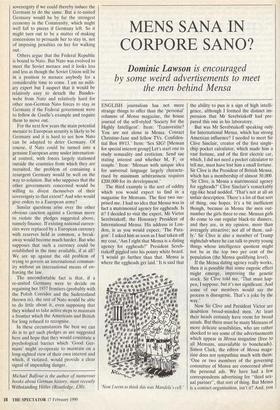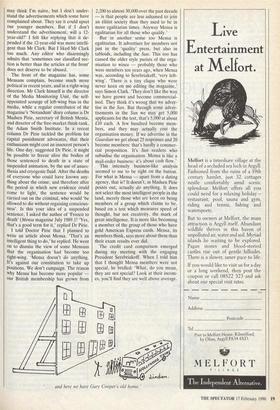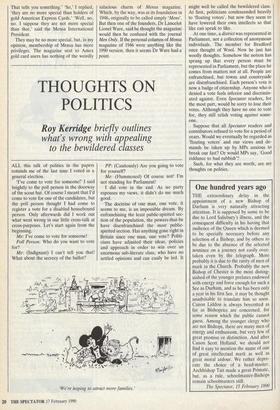MENS SANA IN CORPORE SANO?
Dominic Lawson is encouraged
by some weird advertisements to meet the men behind Mensa
ENGLISH journalism has not more strange things to offer than the 'personal' columns of Mensa magazine, the house journal of the self-styled 'Society for the Highly Intelligent'. Item: 'Transvestite? You are not alone in Mensa. Contact Christine-Jane and fellow TVs. Confiden- tial Box 89/13.' Item: 'Sex SIG! [Mensan for special interest group] Let's start one to study sensuality and eroticism. Send sae stating interest and whether M, F, or couple.' Item: `Mensan with unique idea for universal language largely characte- rised by minimum arbitrariness requires £200,000 for its development.'
The third example is the sort of oddity which you would expect to find in a magazine for Mensans. The first two sur- prised me. I had no idea that Mensa was in fact a matrimonial agency for eggheads. Is it? I decided to visit the expert, Mr Victor Serebriakoff, the Honorary President of International Mensa. His address in Lon- don, is as you would expect, 'The Para- gon'. I asked him as soon as I had taken off my coat, 'Am I right that Mensa is a dating agency for eggheads?' President Sereb- riakoff giggled into his pointy white beard. 'I would go further than that. Mensa is where the eggheads get laid.' It is said that 'Now Iseeni to think this was Mandela's cell.' the ability to pun is a sign of high intelli- gence, although I formed the distinct im- pression that Mr Serebriakoff had pre- pared this one in his laboratory.
But was Mr Serebriakoff speaking only for International Mensa, which has strong American influence? I needed to meet Sir Clive Sinclair, creator of the first single- chip pocket calculator, which made him a vast fortune, and of the first electric car, which, I did not need a pocket calculator to tell me, must have lost him a small fortune. Sir Clive is the President of British Mensa, which has a membership of almost 30,000. 'Sir Clive, is Mensa a matrimonial agency for eggheads?' Clive Sinclair's remarkably egg-like head nodded. 'That's not at all an unfair description. There's a lot of that sort of thing, one hopes. It's a bit inefficient though, because in Mensa the men out- number the girls three to one. Mensan girls do come to our regular black-tie dinners, and they are, in my opinion, more than averagely attractive; not all of them, sad- ly.' Sir Clive is also a member of Tramp nightclub where he can talk to pretty young things whose intelligence quotient might not be in the top two per cent of the population (the Mensa qualifying level).
If the Mensa dating agency really works, then it is possible that some eugenic effect might emerge, improving the genetic stock. Sir Clive told me, 'That must hap- pen, I suppose, but it's not significant. And some of our members would say the process is diseugenic. That's a joke by the way.'
Now Sir Clive and President Victor are doubtless broad-minded men. At least their heads certainly have room for broad minds. But there must be many Mensans of more delicate sensibilities, who are rather shocked to see some of the advertisements which appear in Mensa magazine (free to all Mensans, unavailable to boneheads). Simon Clark, the editor of Mensa maga- zine does not sympathise much with them: 'One or two members of the governing committee of Mensa are concerned about the personal ads. We have had a few correspondents advertising for "third sex- ual partner", that sort of thing. But Mensa is a contact organisation, isn't it? And, you
may think I'm naïve, but I don't under- stand the advertisements which some have complained about. They say it could upset our younger members. But if I don't understand the advertisement, will a 12- year-old?' I felt like replying that it de- pended if the 12-year-old was more intelli- gent than Mr Clark. But I liked Mr Clark too much. Any editor who disarmingly admits that 'sometimes our classified sec- tion is better than the articles at the front' does not deserve to be abused.
The front of the magazine has, some Mensans complain, become much more political in recent years, and in a right-wing direction. Mr Clark himself is the director of the Media Monitoring Unit, the self- appointed scourge of left-wing bias in the media, while a regular contributor of the magazine's `Notandum' diary column is Dr Madsen Pine, secretary of British Mena, and director of the free-market think-tank, the Adam Smith Institute. In a recent column Dr Pine tackled the problem for capital punishment advocates, that their enthusiasm might cost an innocent person's life. One day, suggested Dr Pine, it might be possible to freeze alive the bodies of those sentenced to death in a state of suspended animation, by the use of anaes- thesia and cryogenic fluid. After the deaths of everyone who could have known any- thing about the crime, and therefore after the period in which new evidence could come to light, the sentence would be carried out on the criminal, who would 'be allowed to die without regaining conscious- ness'. Is this your idea of a suspended sentence, I asked the author of `Frozen to death' (Mensa magazine July 1989.)? 'Yes, that's a good term for it,' replied Dr Pine.
I told Doctor Pine that I planned to write an article about Mensa. 'That's an intelligent thing to do,' he replied. He went on to dismiss the view of some Mensans that the organisation had become too right-wing. `Mensa doesn't do anything. It's against our constitution to take up Positions. We don't campaign. The reason Why Mensa has become more popular — our British membership has grown from 2,200 to almost 30,000 over the past decade — is that people are less ashamed to join an elitist society than they used to be in more egalitarian times. Anyway Mensa is egalitarian for all those who qualify.'
But in another sense too Mensa is egalitarian. It advertises for members not just in the 'quality' press, but also in tabloids, including the Sun. This too has caused the older style purists of the orga- nisation to wince — probably those who were members ten years ago, when Mensa was, according to Serebriakoff, `very left- wing'. 'There is a tiny clique who were never keen on me editing the magazine,' says Simon Clark. `They don't like the way we have grown and become commercial- ised. They think it's wrong that we adver- tise in the Sun. But through some adver- tisements in the Sun we may get 5,000 applicants for the test, that's 5,000 at about £.10 each. A few hundred become mem- bers, and they may actually cost the organisation money. If we advertise in the Guardian we get about 25 responses and 20 become members: that's hardly a commer- cial proposition. It's Sun readers who subsidise the organisation. Mensa is like a mail-order business: it's about cash flow.'
This intensely business-like analysis seemed to me to be right on the button. For what is Mensa — apart from a dating agency, that is? It doesn't, as Madsen Fide points out, actually do anything. It does not select the most intelligent people in the land, merely those who are keen on being members of a group which claims to be, based on a test which measures speed of thought, but not creativity, the mark of great intelligence. It is more like becoming a member of the group of those who have gold American Express cards. Mensa, its members think, says more about them than their exam results ever did.
The credit card comparison emerged during my meeting with the engaging President Serebriakoff. When I told him that I thought Mensa members were not special, he bridled: `What, do you mean, they are not special? Look at their incom- es, you'll find they are well above average.
' . . . and here we have Gary Cooper's old home.'
That tells you something.' So,' I replied, 'they are no more special than holders of gold American Express Cards."Well, no, no. I suppose they are not more special than that,' said the Mensa International President.
They may be no more special, but, in my opinion, membership of Mensa has more privileges. The magazine sent to Amex gold card users has nothing of the weirdly
salacious charm of Mensa magazine. Which, by the way, was at its foundation in 1946, originally to be called simply Wens'. But then one of the founders, Dr Lancelot Lionel Ware, said he thought the magazine would then be confused with the journal Men Only. If the personal columns of Mensa magazine of 1946 were anything like the 1990 version, then it seems Dr Ware had a point.




















































 Previous page
Previous page